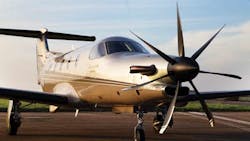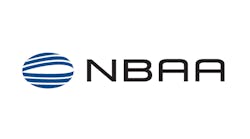The world's first seven-bladed propeller for general aviation is now supplemental type certified by FAA STC SA02742NY on the Pilatus PC-12 powered by a Pratt & Whitney P&WC PT6A-67B or PT6A-67P propeller turbine.
(PT6A-67P Engine Installation according to EASA STC 10065179 (FAA STC SA02266LA))
When starting developing the world's first 7-bladed propeller for General Aviation in 2016 MT-Propeller had the same vision like in year 1999 when we came up with the first five-bladed prop for turboprops. The five-bladed prop became an industrial standard with more than 2,500 propellers sold for various kinds of turboprops and it is still an ongoing success story. The seven-bladed propeller is pushing the new limits for certain applications to go beyond the achievement of the 5-bladed propellers.
The Silent 7 is already supplemental type certified on the PC12 by EASA STC 10014953 R3.
MT-Propeller vice president Martin Albrecht says that the installation of the 7-bladed MT-Propeller on the propeller turbine driven aircraft PC-12 features the following advantages:
- No engine modifications necessary
- Certified Ground roll distance reduced by approx. 10 percent; AFMS amended
- Certified Take-off distance over 50 ft obstacle reduced by approx. 15 percent; AFMS amended
- Climb performance improved
- Aircraft noise level is about four dB(A) less than with the original metal propeller
- Cabin noise is reduced by six to seven dB(A) depending on location
- Comply with the strict German noise regulations 2010 - Landeplatz Lärmschutz Verordnung for unrestricted airport operations in Germany and other European Countries
Due to the smaller diameter, the seven-bladed MT-Propeller for the Pilatus PC-12 has more ground clearance for less blade tip erosion and FODs.
The MT-Propeller natural composite blades provide significant inside and outside noise reduction. They have no life limitation and are repairable in case of an FOD.
They also provide best vibration damping characteristics for almost vibration-free propeller operation and have bonded on nickel alloy leading edges for superior erosion protection of the blades.



